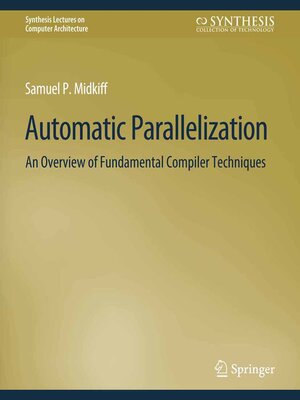Automatic Parallelization
ebook ∣ An Overview of Fundamental Compiler Techniques · Synthesis Lectures on Computer Architecture
By Samuel Midkiff

Sign up to save your library
With an OverDrive account, you can save your favorite libraries for at-a-glance information about availability. Find out more about OverDrive accounts.
Find this title in Libby, the library reading app by OverDrive.



Search for a digital library with this title
Title found at these libraries:
| Loading... |
Compiling for parallelism is a longstanding topic of compiler research. This book describes the fundamental principles of compiling "regular" numerical programs for parallelism. We begin with an explanation of analyses that allow a compiler to understand the interaction of data reads and writes in different statements and loop iterations during program execution. These analyses include dependence analysis, use-def analysis and pointer analysis. Next, we describe how the results of these analyses are used to enable transformations that make loops more amenable to parallelization, and discuss transformations that expose parallelism to target shared memory multicore and vector processors. We then discuss some problems that arise when parallelizing programs for execution on distributed memory machines. Finally, we conclude with an overview of solving Diophantine equations and suggestions for further readings in the topics of this book to enable the interested reader to delve deeper into the field. Table of Contents: Introduction and overview / Dependence analysis, dependence graphs and alias analysis / Program parallelization / Transformations to modify and eliminate dependences / Transformation of iterative and recursive constructs / Compiling for distributed memory machines / Solving Diophantine equations / A guide to further reading






